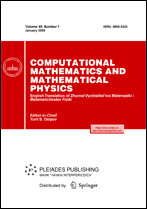|
This article is cited in 6 scientific papers (total in 6 papers)
Reconstruction of magnetic susceptibility using full magnetic gradient data
Y. Wangabc, I. I. Kolotovd, D. V. Lukyanenkod, A. G. Yagolad
a Key Laboratory of Petroleum Resource Research, Institute of Geology and Geophysics, Chinese Academy of Sciences,
Beijing, 100029 P. R. China
b University of the Chinese Academy of Sciences, Beijing, 100049 P. R. China
c Institutions of Earth Science, Chinese Academy of Sciences, Beijing,100029 P. R. China
d Faculty of Physics, Lomonosov Moscow State University
Abstract:
The paper discusses the specificities of solving the inverse problem of reconstructing the magnetic susceptibility using complete tensor magnetic gradient data. This problem reduces to solving a system of two three-dimensional Fredholm integral equations of the first kind, one of which relates the magnetic susceptibility of a bounded body to the magnetic field induced by it and the other, to the full magnetic induction gradient tensor. For a series of model examples, it is demonstrated that the use of the full magnetic induction gradient tensor significantly improves the quality of the reconstructed function that determines the magnetic susceptibility.
Key words:
magnetostatics, magnetic susceptibility, full magnetic induction gradient tensor, inverse problem.
Received: 28.10.2019
Revised: 28.10.2019
Accepted: 11.02.2020
Citation:
Y. Wang, I. I. Kolotov, D. V. Lukyanenko, A. G. Yagola, “Reconstruction of magnetic susceptibility using full magnetic gradient data”, Zh. Vychisl. Mat. Mat. Fiz., 60:6 (2020), 1027–1034; Comput. Math. Math. Phys., 60:6 (2020), 1000–1007
Linking options:
https://www.mathnet.ru/eng/zvmmf11092 https://www.mathnet.ru/eng/zvmmf/v60/i6/p1027
|


|





 Contact us:
Contact us: Terms of Use
Terms of Use
 Registration to the website
Registration to the website Logotypes
Logotypes








 Citation in format
Citation in format 
